Hyundai IONIQ 5 vs XPeng G6 - Differences and prices compared
Compare performance (650 HP vs 487 HP), boot space and price (38500 £ vs 40800 £ ) at a glance. Find out which car is the better choice for you – Hyundai IONIQ 5 or XPeng G6?
Costs and Efficiency:
Price and efficiency are key factors when choosing a car – and this is often where the real differences emerge.
Hyundai IONIQ 5 has a minimal advantage in terms of price – it starts at 38500 £ , while the XPeng G6 costs 40800 £ . That’s a price difference of around 2315 £.
In terms of energy consumption, the advantage goes to the Hyundai IONIQ 5: with 15.60 kWh per 100 km, it’s slightly more efficient than the XPeng G6 with 17.50 kWh. That’s a difference of about 1.90 kWh.
As for electric range, the Hyundai IONIQ 5 performs hardly perceptible better – achieving up to 570 km, about 45 km more than the XPeng G6.
Engine and Performance:
Under the bonnet, it becomes clear which model is tuned for sportiness and which one takes the lead when you hit the accelerator.
When it comes to engine power, the Hyundai IONIQ 5 has a evident edge – offering 650 HP compared to 487 HP. That’s roughly 163 HP more horsepower.
In acceleration from 0 to 100 km/h, the Hyundai IONIQ 5 is slightly quicker – completing the sprint in 3.50 s, while the XPeng G6 takes 4.10 s. That’s about 0.60 s faster.
In terms of top speed, the Hyundai IONIQ 5 performs clearly perceptible better – reaching 260 km/h, while the XPeng G6 tops out at 200 km/h. The difference is around 60 km/h.
There’s also a difference in torque: Hyundai IONIQ 5 pulls slightly stronger with 770 Nm compared to 660 Nm. That’s about 110 Nm difference.
Space and Everyday Use:
Cabin size, boot volume and payload all play a role in everyday practicality. Here, comfort and flexibility make the difference.
Both vehicles offer seating for 5 people.
In curb weight, Hyundai IONIQ 5 is minimal lighter – 1955 kg compared to 2115 kg. The difference is around 160 kg.
In terms of boot space, the XPeng G6 offers hardly perceptible more room – 571 L compared to 520 L. That’s a difference of about 51 L.
In maximum load capacity, the Hyundai IONIQ 5 performs to a small extent better – up to 1580 L, which is about 206 L more than the XPeng G6.
When it comes to payload, Hyundai IONIQ 5 a bit takes the win – 530 kg compared to 475 kg. That’s a difference of about 55 kg.
Who wins the race in the data check?
The Hyundai IONIQ 5 is far ahead overall in the objective data comparison.
This result only shows which model scores more points on paper – not which of the two cars feels right for you.
Costs and Consumption
View detailed analysis
Engine and Performance
View detailed analysis
Dimensions and Body
View detailed analysis
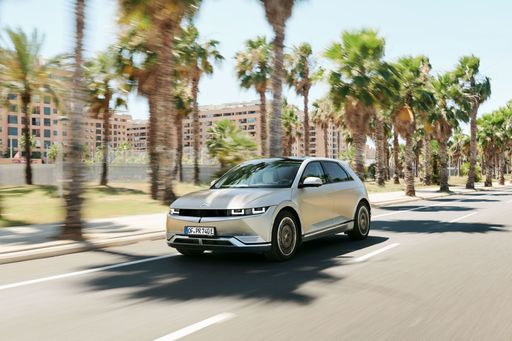
Hyundai IONIQ 5
Hyundai IONIQ 5
The Hyundai IONIQ 5 looks like a spaceship that moved into suburbia, pairing bold retro‑futuristic styling with a roomy, cleverly laid-out cabin that makes long trips surprisingly comfortable. Its electric character delivers instant, silky acceleration and low running costs, making it a smart, slightly cheeky pick for buyers who want tech, practicality and personality without the drama.
details
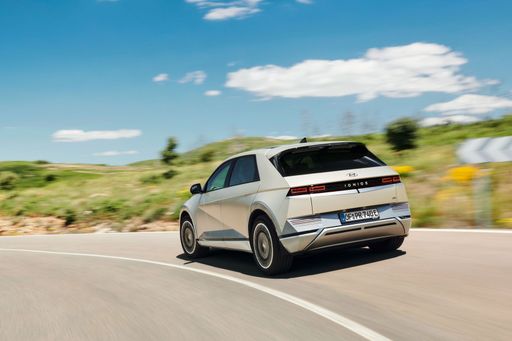
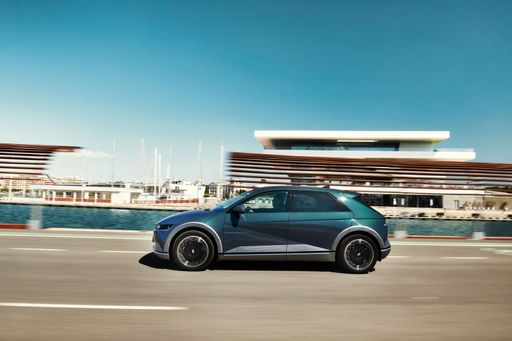
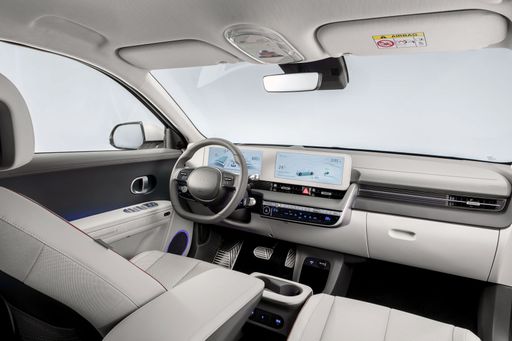
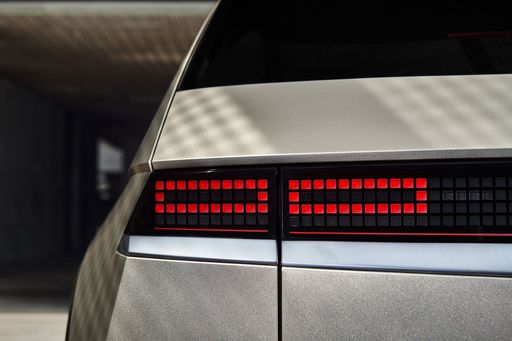
XPeng G6
The XPeng G6 looks like a sleeker, tech-rich alternative to conventional electric SUVs, with an interior that feels modern, airy and purposefully designed for everyday comfort. On the road it’s composed and surprisingly engaging, giving drivers a smart mix of calm refinement and a playful streak — not bad for a car that quietly challenges the usual premium suspects.
details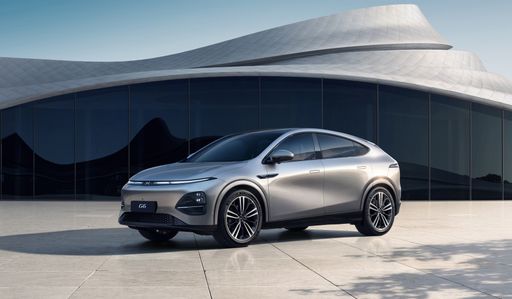
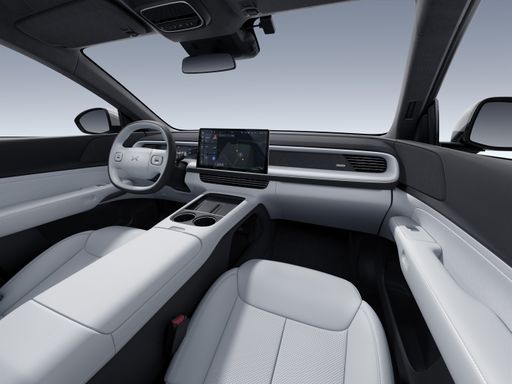
Costs and Consumption |
|
|---|---|
|
Price
38500 - 64200 £
|
Price
40800 - 44200 £
|
|
Consumption L/100km
-
|
Consumption L/100km
-
|
|
Consumption kWh/100km
15.6 - 21.2 kWh
|
Consumption kWh/100km
17.5 - 18.4 kWh
|
|
Electric Range
440 - 570 km
|
Electric Range
510 - 525 km
|
|
Battery Capacity
63 - 84 kWh
|
Battery Capacity
80 kWh
|
|
co2
0 g/km
|
co2
0 g/km
|
|
Fuel tank capacity
-
|
Fuel tank capacity
-
|
Dimensions and Body |
|
|---|---|
|
Body Type
SUV
|
Body Type
SUV
|
|
Seats
5
|
Seats
5
|
|
Doors
5
|
Doors
5
|
|
Curb weight
1955 - 2275 kg
|
Curb weight
2115 - 2220 kg
|
|
Trunk capacity
480 - 520 L
|
Trunk capacity
571 L
|
|
Length
4655 - 4715 mm
|
Length
4758 mm
|
|
Width
1890 - 1940 mm
|
Width
1920 mm
|
|
Height
1585 - 1605 mm
|
Height
1650 mm
|
|
Max trunk capacity
1540 - 1580 L
|
Max trunk capacity
1374 L
|
|
Payload
385 - 530 kg
|
Payload
470 - 475 kg
|
Engine and Performance |
|
|---|---|
|
Engine Type
Electric
|
Engine Type
Electric
|
|
Transmission
Automatic
|
Transmission
Automatic
|
|
Transmission Detail
Reduction Gearbox
|
Transmission Detail
Reduction Gearbox
|
|
Drive Type
Rear-Wheel Drive, All-Wheel Drive
|
Drive Type
Rear-Wheel Drive, All-Wheel Drive
|
|
Power HP
170 - 650 HP
|
Power HP
296 - 487 HP
|
|
Acceleration 0-100km/h
3.5 - 8.5 s
|
Acceleration 0-100km/h
4.1 - 6.7 s
|
|
Max Speed
185 - 260 km/h
|
Max Speed
200 km/h
|
|
Torque
350 - 770 Nm
|
Torque
440 - 660 Nm
|
|
Number of Cylinders
-
|
Number of Cylinders
-
|
|
Power kW
125 - 478 kW
|
Power kW
218 - 358 kW
|
|
Engine capacity
-
|
Engine capacity
-
|
General |
|
|---|---|
|
Model Year
2024 - 2025
|
Model Year
2025
|
|
CO2 Efficiency Class
A
|
CO2 Efficiency Class
A
|
|
Brand
Hyundai
|
Brand
XPeng
|
What drive types are available for the Hyundai IONIQ 5?
The Hyundai IONIQ 5 is available as Rear-Wheel Drive or All-Wheel Drive.




